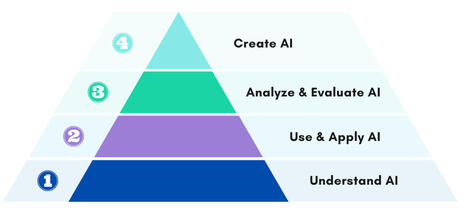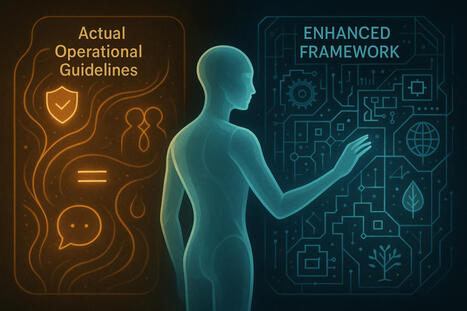 Your new post is loading...
 Your new post is loading...

|
Scooped by
Ana Cristina Pratas
September 29, 2025 8:11 AM
|
Abstract
With the rapid development of Artificial Intelligence (AI) technology, the application of AI in the field of education has gradually become one of the key factors in improving teaching quality and student abilities. Based on the conservation of resources theory, this study explores how the usage of AI in teaching impacts students’ creativity, exploring the mediating role of learning engagement and the moderating role of AI literacy. The research finds that the usage of AI in teaching significantly enhances students’ creativity, with learning engagement playing a mediating role in this process, thereby promoting creativity improvement. In addition, AI literacy moderates the relationship between the usage of AI in teaching and learning engagement. The results of this study not only expand the application of the conservation of resources theory in the field of education but also emphasize the important role of AI literacy in AI teaching, providing valuable policy suggestions for educational practices.

|
Scooped by
Ana Cristina Pratas
September 25, 2025 9:36 AM
|
This blog post is an update to two previous entries that focused on AI detection tools: ‘AI Detection: Latest Recommendations’ (September 2023) and ‘AI Writing Detectors – Concepts and Considerations’ (March 2023). As we look ahead to the next academic year, this feels like an opportune moment to revisit the topic. The core concepts and […]

|
Scooped by
Ana Cristina Pratas
September 25, 2025 9:26 AM
|
Academic and technologies teams at Barnard College developed an AI literacy framework to provide a conceptual foundation for AI education and programm

|
Scooped by
Ana Cristina Pratas
September 24, 2025 8:23 AM
|
Sci-fi Scenarios Sci-Fi Scenarios for Teaching and Learning that Could Become Reality by 2035 - Part 2: Stephen Downes This post is part of Sci-Fi Scenarios, the foresight series on TeachOnline.ca in which leaders in education and technology respond to five “sci-fi–sounding but plausible” AI...

|
Scooped by
Ana Cristina Pratas
September 23, 2025 2:15 PM
|
AI can churn out answers; educators must teach the craft of the question. GUEST COLUMN | by Arlène Botokro When I was little, I asked endless questions—the kind that wore adults out and never settled for a simple “because that’s just the way it is.” Over time, I learned to choose my moments better, but […]

|
Scooped by
Ana Cristina Pratas
September 16, 2025 3:18 PM
|
Education has moved past experimenting with AI features. The next leap is agentic AI—autonomous systems that connect tools, streamline workflows, and drive measurable outcomes across learning environments. GUEST COLUMN | by Rishi Raj Gera Since the public release of ChatGPT in November 2022, generative AI has rapidly entered mainstream education conversations. From automated grading and […]

|
Scooped by
Ana Cristina Pratas
September 10, 2025 8:06 AM
|
Learn how AI transparency statements empower students to use GenAI responsibly, reflect on their process, and protect their personal voice in higher education.

|
Scooped by
Ana Cristina Pratas
September 3, 2025 8:17 AM
|
Boost student satisfaction with smarter course webpage design—clear navigation, simple visuals, and customization for better online learning.

|
Scooped by
Ana Cristina Pratas
August 27, 2025 8:37 AM
|
Earlier this year I went on a Disney cruise with my extended family. Seasickness aside, another notable experience was the dining: a sit-dow

|
Scooped by
Ana Cristina Pratas
August 22, 2025 8:23 AM
|
Learn how to transform classroom discussions with proven communication strategies from health coaching—like open-ended questions, affirmations, and active listening—to foster student engagement and deeper learning in higher education.

|
Scooped by
Ana Cristina Pratas
August 22, 2025 8:19 AM
|
This book brings you, the reader, into a community of college educators engaged in the ongoing process of learning to teach inclusively.

|
Scooped by
Ana Cristina Pratas
August 13, 2025 8:16 AM
|
Explore how AI is reshaping higher education as faculty navigate ethics, pedagogy, and student engagement—offering practical strategies for integrating AI in the classroom with purpose and clarity.

|
Scooped by
Ana Cristina Pratas
August 6, 2025 8:13 AM
|
Emerging from a rich tapestry of educational theory, practical advice, and personal narrative, Joy-Centered Pedagogy in Higher Education introduces joy as a
|

|
Scooped by
Ana Cristina Pratas
September 29, 2025 8:09 AM
|
Prompt: Formulate your initial request.
Generate Output: Allow the AI to respond.
Analyze: Evaluate the output critically against your goals.
Refine Prompt: Adjust your original prompt based on the analysis.
Repeat: Return to Step 2 with the refined prompt until satisfied.

|
Scooped by
Ana Cristina Pratas
September 25, 2025 9:27 AM
|
(Spoiler alert: it has been very successful, but there are some lessons to be learned)

|
Scooped by
Ana Cristina Pratas
September 24, 2025 8:24 AM
|
Sci-fi Scenarios Sci-Fi Scenarios for Teaching and Learning that Could Become Reality by 2035 - Part 1: Stephen Murgatroyd This post is part of Sci-Fi Scenarios, the foresight series on TeachOnline.ca in which leaders in education and technology respond to five “sci-fi–sounding but plausible” AI...

|
Scooped by
Ana Cristina Pratas
September 24, 2025 8:18 AM
|
Discover how grading for growth and competency-based assessment can shift education from point-chasing to meaningful learning, empowering students to focus on mastery, reflection, and continuous improvement.

|
Scooped by
Ana Cristina Pratas
September 19, 2025 8:10 AM
|
Discover how joyful pedagogy transforms higher education by boosting student engagement, fostering creativity, and sparking meaningful connections through play, active learning, and innovative teaching strategies.

|
Scooped by
Ana Cristina Pratas
September 15, 2025 8:31 AM
|
Explore five ways AI is reshaping faculty work in higher education—from teaching and course design to reasoning, creativity, and student success.

|
Scooped by
Ana Cristina Pratas
September 7, 2025 12:15 PM
|
When you work on your computer, you should be able to understand what files are. As an example, a Word document (.docx) sits on your drive. You can open it, edit it, share it, and check its metadata. You can download Microsoft Word itself, see version histories, and even unpack the contents to...

|
Scooped by
Ana Cristina Pratas
August 27, 2025 8:38 AM
|
Generative artificial intelligence (AI) has created new challenges for educators seeking to design assessments that provide assurance of learning and uphold academic integrity

|
Scooped by
Ana Cristina Pratas
August 27, 2025 8:36 AM
|
Abstract
Generative AI (GenAI) challenges assessment validity by enabling students to complete tasks without demonstrating genuine capability. In response to this challenge, institutions have developed and implemented various approaches that aim to communicate permissible AI use to students. Familiar examples include the ‘traffic light’ approach now commonly found within institutional policy. While well-intentioned, these approaches share a common limitation: They focus primarily on communicating rules rather than redesigning assessment mechanics. To clarify why such approaches fail, and to guide more effective responses, this paper introduces a novel conceptual distinction between discursive changes to assessment (modifications relying solely on instructions students remain free to ignore) and structural changes (modifications that reshape the underlying mechanics of assessment tasks themselves). Through a critical analysis of prominent frameworks, we demonstrate that current approaches predominantly rely on discursive changes that create what we term an ‘enforcement illusion’. We find that educational frameworks frequently borrow the language of socially familiar structural systems (like vehicular traffic lights) while lacking their actual enforcement capabilities, creating an illusion of assessment security. In place of this, we argue for a shift towards structural assessment redesign that builds validity into assessment architecture rather than attempting to impose it through unenforceable rules.

|
Scooped by
Ana Cristina Pratas
August 22, 2025 8:20 AM
|
Writing Beyond the UniversityPreparing Lifelong Learners for Lifewide WritingEdited by Julia Bleakney, Jessie L. Moore, and Paula RosinskiDownload Book Download BookOpen access PDFdoi.org/10.36284/celelon.oa5ISBN: 978-1-951414-08-5October 3, 20225.5 MBMetrics: 4781 views | 1171 downloadsISBN:...

|
Scooped by
Ana Cristina Pratas
August 18, 2025 8:11 AM
|
Learn how to use AI in your courses—and teach your students to use it responsibly. Discover practical tools, tips, and strategies for higher ed success.

|
Scooped by
Ana Cristina Pratas
August 10, 2025 4:58 AM
|
In following along on a conversation via Linked In, I saw Shana V. White ask this question: How do you define "ethically"? Later, someone asks the question that Shana may really be asking in regards to AI, "What is ethical AI?" From my perspective, the questions raise the bigger issues. It reminded me of a…
|

 Your new post is loading...
Your new post is loading...
 Your new post is loading...
Your new post is loading...
































